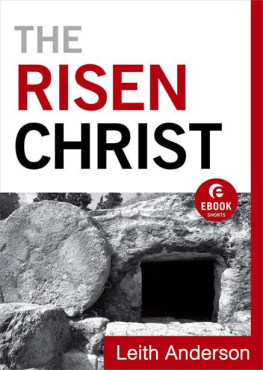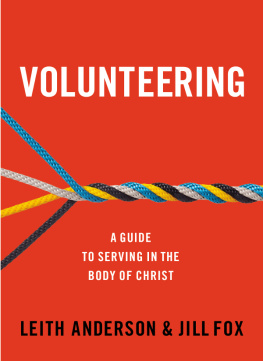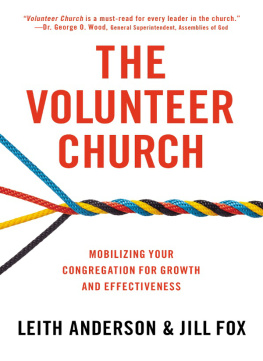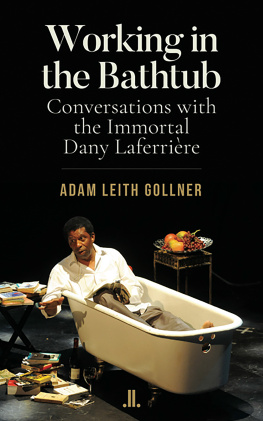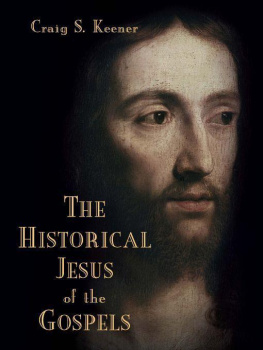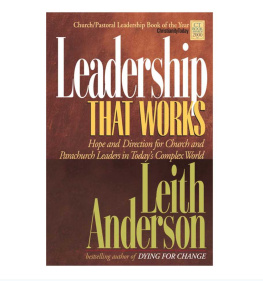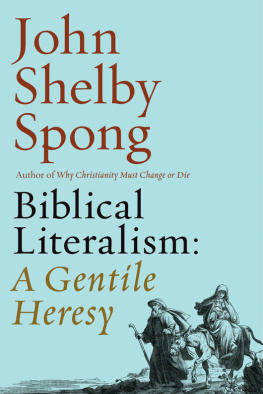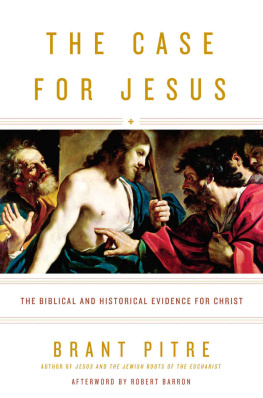The material in this ebook is adapted from the book Jesus: An Intimate Portrait by Leith Anderson.
Scripture quotations identified NIV are from the HOLY BIBLE, NEW INTERNATIONAL VERSION. Copyright 1973, 1978, 1984 by International Bible Society. Used by permission of Zondervan Publishing House. All rights reserved. www.zondervan.com
All rights reserved. No part of this publication may be reproduced, stored in a retrieval system, or transmitted in any form or by any meanselectronic, mechanical, photocopy, recording, or otherwisewithout the prior written permission of the publisher. The only exception is brief quotations in printed reviews.
Baker Publishing Group, Grand Rapids, Michigan.
Library of Congress Cataloging-in-Publication Data is on file at the Library of Congress, Washington, DC.
A Note to the Reader
What is this book? At its most basic, it is a story of Jesus death and resurrection, harmonizing and integrating the four Gospels from the Bible in a reasonable chronological order. Beyond that, with contemporary readability it weaves in his storys first-century historical setting, along with the cultural and political perspectives of the time.
The Gospels, the first four books of the Bibles New Testament, were written by four disciples of Jesus: Matthew, Mark, Luke, and John. These original biographers drew from personal experience, eyewitness interviews, and historical resources.
They sometimes arranged their material chronologically and other times topically. When they quoted Jesus, some included more of what he said than others. In this biography, multiple accounts of teaching and miracles are merged into single reports. Quotes are paraphrased and blended, sometimes taking part of a quote from one Gospel account of an event and the rest of the quote from the other places where it is reported.
The intention here is not to replace the original biographers accounts but to present the story in a fresh, readable and reliable style that is both comprehensive and consistent. The serious student will want to compare to the Bible in order to read complete quotes and reports of the events of Jesus life in their original wording and context.
The Risen Christ uses a literary device currently popular in the writing of historical biography, adding descriptive language to conversations, emotions, and thought processes to facilitate the telling of the story. While they may not be historically documented, these embellishments are likely, based on historical or archaeological evidence of the times.
If I have done my job well, whether Jesus story is new to you or very familiar, reading this book will send you to those four original biographers.
Leith Anderson
January 2005
Chapter One
G ethsemane was a comfortable and familiar place, holding a myriad of good memories. Jesus and his disciples had been there so often that every tree and path must have been familiar. When they had been there during daylight hours, Jerusalem gleamed like a celestial city with all its whitewashed houses and the magnificent temple on the western horizon. At night the city could appear almost mystical with the flickering of oil lanterns in the windows. It was especially beautiful at sunset with the smoke from cooking fires turning the suns rays into a rainbow of oranges, yellows, and reds.
But this was not a night for joy. Those old trees for which Mount Olivet was named would witness anguish and tyranny before the night was over. That Thursday night would become a moral preview of the physical destruction of the garden and all the olive trees in AD 70 when the soldiers of Titus would cut down every one of them.
Sit here while I go over there and pray, Jesus told his disciples as he pointed toward his place of prayer in an abandoned oil press. They had spent several hours together there on Tuesday afternoon. Pray that you wont cave in to temptation.
Gethsemane means oil press, and that is where the garden got its name. Olives were gathered in baskets and transported to a shallow rock cistern and then crushed with a large upright millstone.
Peter, Jesus said, you and the Zebedee brothers come with me. The four of them walked the path to the oil press. During the short walk, a dark cloud of sorrow and trouble fell over Jesus like a sudden storm on Galilees lake. Jesus said, My soul is so sad that I feel like Im going to die! Of course this was absolutely frightening to his friendshe was dying before their eyes, but it was not like other deaths they had seen. It was almost as if he were being crushed to death by a massive but unseen spiritual mountain. Forcing himself to go on, he told the three to stay there and stay alert.
Jesus went a short distance and collapsed onto his knees in a position for prayer. He painfully said to God, Abba, Father, you can do absolutely anything. Take this cup of suffering and death away from me. Yet its not what I want, but what you want.
Abba was the Aramaic name that children called their fathers, similar to Daddy. It was an unusual and particularly intimate term for Jesus to use. Interestingly, the term carried over into the Greek-language worship of early Christians.
Supernatural forces were colliding. Jesus dreaded the horrific death coming the next day. He knew that God was his Father and had ultimate divine powers. The anticipation of the cup of death was already taking him down. How could he endure all that was coming? He pleaded with his Father for a way out. Others had received miracles to meet their needs, and now he prayed for a miracle to meet his need.
Jesus must have known the answernobefore he asked. Gods will was for him to die on Friday, and Jesus, the Son of God, was committed to doing the will of his Father. The agony of all this was horribly wrenching, and the divine response was to send an angelnot an angel to call off the suffering, but an angel to give him strength. With the renewed physical and spiritual strength the angel provided, Jesus prayed even more earnestly and passionately. Sweat dripped off him like drops of blood pouring to the ground.
Jesus stood up and went back to his disciples, yearning for the company and support of his dearest friends. Despite all their misunderstanding of him and his message, along with too many moments of selfishness, they were the ones who were closest to him, and he loved them deeply. He wanted their help. Instead of finding them praying for him, he found them sleeping. One further blow to a man who was already down and dying. Jesus looked at Peter with sadness as he asked them all, Are you asleep? Could you not keep your eyes open for just an hour? No one answeredmaybe just one woke up enough to hear him say, Stay awake and pray so that you will not slip into temptation. The spirit may be willing, but the body is weak.
Jesus went back to his place of prayer, his heart heavy with grief. The ground was still damp from tears and sweat. He knelt a second time and prayed the same request: My Father, if you still say I have to drink this cup of agony, Ill do what you want. It was a statement with an implied question. And the answer was still no. This wasnt going to be called off.
Seeking their support, he returned again to his friends. They had been there for him in the past. They had as recently as their supper together declared their love loud and long. Judas the betrayer was gone, the loyal eleven remained, but his closest were asleep again. Jesus turned around and returned to pray. Same prayer. Same answer.

